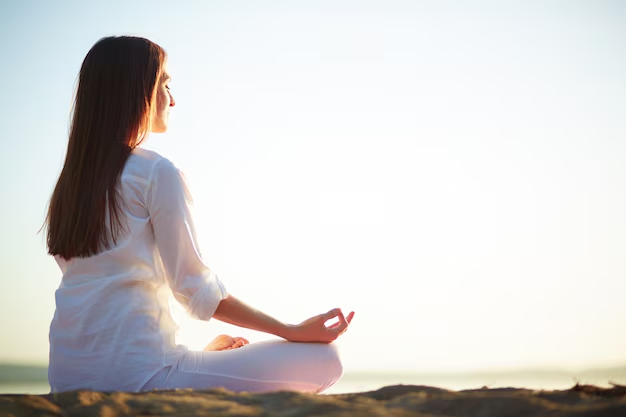It is not easy to find peace and tranquility in the fast-paced life of the year 2025. Every day mobile notifications, work pressure and personal responsibilities force us to keep running. In such an environment, our mind remains active all the time, but the heart and soul often feel tired. This is the reason why today mindful living has become not just a trend but an essential lifestyle .
Mindful living means living every moment with awareness, balance and peace. It is not limited to meditation, but can also be adopted through small habits. Like waking up in the morning and breathing deeply for a few minutes, doing digital detox once a day or writing gratitude before sleeping at night. These small steps not only free us from stress but also make the mind deeply calm and stable.

Nowadays, many researches also prove that mindfulness not only strengthens mental health, but also increases our concentration, emotional balance and productivity. This is the reason why in 2025, everyone from students to professionals and housewives to senior citizens is trying to improve their lives by adopting these mindful habits .
In this blog, we will learn how some simple and practical habits can lead you to inner calm, clarity, and a relaxed life. Whether you are new or already practicing meditation—these habits can bring small but extremely positive changes to your everyday life.
Points related to mindfulness
- living in the present moment
2. Focus on the breath
3. Do a digital detox
4. Gratitude
5. Mindful Eating
6. Controlling negative thoughts
7. association with nature
8. Practice Self-Compassion
9. Practicing Meditation
10. Start the day with gratitude
11. Connect with nature
12. Mindful Breathing
1. living in the present moment:

- Mindfulness teaches us that it is important to live inthe present moment with full awareness, letting go of worries about the past and the future.
2. Focus on the breath:
When you close your eyes and completely feel the process of breathing in and out , your mind gradually becomes calm. We breathe unconsciously throughout the day, but the practice of meditation teaches us to experience it with awareness .

How to do:
- Sit comfortably and close your eyes.
- Pay attention to your breathing—how the air goes in through your nose and then slowly comes out.
- You can count each breath (e.g., 1 inhale, 2 exhale) so that your mind doesn’t wander.
- Even if your mind wanders, without getting angry, just gently bring your attention back to your breath.
Benefits :
- The mind gets peace and clarity.
- Concentration increases.
- Stress, anxiety and negative thoughts gradually begin to reduce.
- Both body and mind feel relaxed.
That is why it is said – “Breath is the bridge of life” . When you learn to control your breath, you also start gaining control over your mind and emotions.
3. Do a digital detox:
- Stay away from mobile, social media and screen for a few hours a day.
- Instead, read a book, listen to music, or connect with nature.
4. Gratitude:
- Wake up in the morning and write down 3 things you are grateful for.
- This practice will fill your day with positive energy.
- Write down 2-3 things every day that you are grateful for. This practice makes your perspective positive.
5. Mindful Eating:

- Instead of swallowing food quickly, taste it slowly and feel the taste of each bite. This not only improves digestion but also gives satisfaction.
6. Controlling negative thoughts :

“Controlling Negative Thoughts” is a very important part of meditation and mindfulness.
Thousands of thoughts come to our mind throughout the day. Many of these are positive, but often negative thoughts bother us. Such as-
- “I can’t do this”
- “What will people think of me?”
- “What if it fails?”
These thoughts gradually lead to stress, anxiety and lack of confidence . Meditation gives us the power to identify and control these.
How to control negative thoughts?

- Identify the Thoughts
First, acknowledge that you are having negative thoughts. Don’t try to suppress them or escape them. Just recognize—”Yes, this thought is on my mind right now.” - Observe the thought from a distance.
Consider yourself an “observer”. As if you are watching a film and thoughts are passing on the screen. Do not get entangled in them, just observe and let them pass. - Return to the breath
When negative thoughts start bothering you, take a few deep breaths and bring your focus back to breathing . This calms the mind instantly. - Change the thought:
If the mind says, “I will fail,” then change it and say, “I am trying and learning slowly.” This practice is called positive affirmation . - Learn to let go.
Meditation teaches that not every thought is permanent. Just like clouds come and go in the sky, thoughts also come and go. There is no need to hold on to them.
Benefits-
- The mind becomes light and calm.
- Self-confidence increases.
- Stress and anxiety are reduced.
- Sleep gets better.
That is, meditation makes us understand that “You are not your thoughts, but you are the witness of your thoughts.”
When this is understood, negative thoughts begin to weaken on their own.
7. Practice Self-Compassion :
- Be kind to yourself.
- Instead of blaming yourself for your mistakes, consider them a learning opportunity.
- Tell yourself this every day—“I am enough just the way I am.”
8. Practicing Meditation :
- Meditate for at least 10–15 minutes every day.
- Focus on your breath and let your mind wander, then slowly bring it back.
- Meditation reduces stress and brings peace to the soul.
9. Start the day with gratitude :
- Wake up in the morning and write down 3 things you are grateful for.
- This practice will fill your day with positive energy.
10. Mindful Breathing:
- Take a deep breath, hold for a few seconds, and exhale slowly.
- This practice reduces stress and anxiety instantly.
11. Connect with nature
- Spend some time every day with plants, sunlight and fresh air.
- Nature gives peace and balance to the soul.
Meditation :

Meditation is a practice in which a person concentrates his mind so that he can achieve mental peace, self-awareness and balance. In simple language, meditation means stabilizing the mind in the present moment and getting free from unnecessary thoughts.
Some important things about meditation:
- Calming the mind – During meditation we do not control our thoughts but let them come and go freely and just feel the peace within us.
- Concentration – Meditation increases the ability to focus, whether it is on the breath, a mantra, or a particular point.
- Relief from stress – Regular meditation reduces stress, anxiety and mental pressure and makes the mind feel lighter.
- Spiritual Connection – Meditation is not just good for mental health but is also a way to connect with the soul and consciousness.
- Health Benefits – It improves sleep, controls blood pressure and improves overall health.
In short, meditation is a practice that teaches us to live in the present, calm the mind, and feel life deeply .
Important things related to meditation


- Meaning of Meditation
- Dhyana literally means “concentration” or “focusing”.
- It keeps the mind from wandering and anchors it in the present moment.
- Types of meditation
- Mindfulness meditation – focusing on the breath and the present moment.
- Mantra meditation – steadying the mind by repeating a mantra or word.
- Pranayama Meditation – Meditation done with breathing techniques.
- Tratak meditation – focusing the mind by looking at a single point (like the flame of a lamp).
- The purpose of meditation
- Finding mental peace and balance.
- Increasing self-awareness and self-control.
- Bringing positivity and compassion into life.
- benefits of meditation
- Stress, anxiety, and depression are reduced.
- The quality of sleep improves.
- Concentration and memory power increases.
- Emotional balance is maintained.
- Immunity becomes stronger.
- The right time to meditate
- It is most effective to meditate in the early morning (before sunrise).
- By meditating before sleeping at night, the mind becomes calm and sleep comes deep.
- A place to meditate
- Choose a quiet and clean place.
- Where there is good flow of air and light.
- Sit away from mobile and other distractions.
- How to meditate (simple steps)
- Sit comfortably in Padmasana or Sukhasana.
- Close your eyes and keep your spine straight.
- Take a deep breath and exhale.
- Don’t force your thoughts to stop; let them come and go freely.
- Gradually focus only on the breath or mantra.
- attention span
- 5–10 minutes is enough in the beginning.
- Gradually it can be increased to 20–30 minutes.
- The relationship between meditation and diet
- Light and satvik food is considered good for meditation.
- Heavy, fried or intoxicating foods destabilize the mind.
- Meditation and Spirituality
- It is not just a health or stress-relief technique, but also a way to connect with spirit and the universe.
- Through meditation, a person is able to understand his true nature and the purpose of life.
In short : Meditation is not just about sitting and closing your eyes, it is the art of connecting the mind, body and soul.
Summary :
Meditation is a practice that helps us to balance our mind, body and mind.to balanceTry to bring yourself into the present moment . Regular meditation reduces stress,
This is the essence of meditation – the journey within., where we connect with ourselves
FAQ ?
#Mindfulness #Meditation #PositiveVibes #HealthyMind #SoulCare #StressRelief #Carrerbook#Anslation#InnerPeace #SelfGrowth #CalmMind #GratitudePractice


Leave a Reply